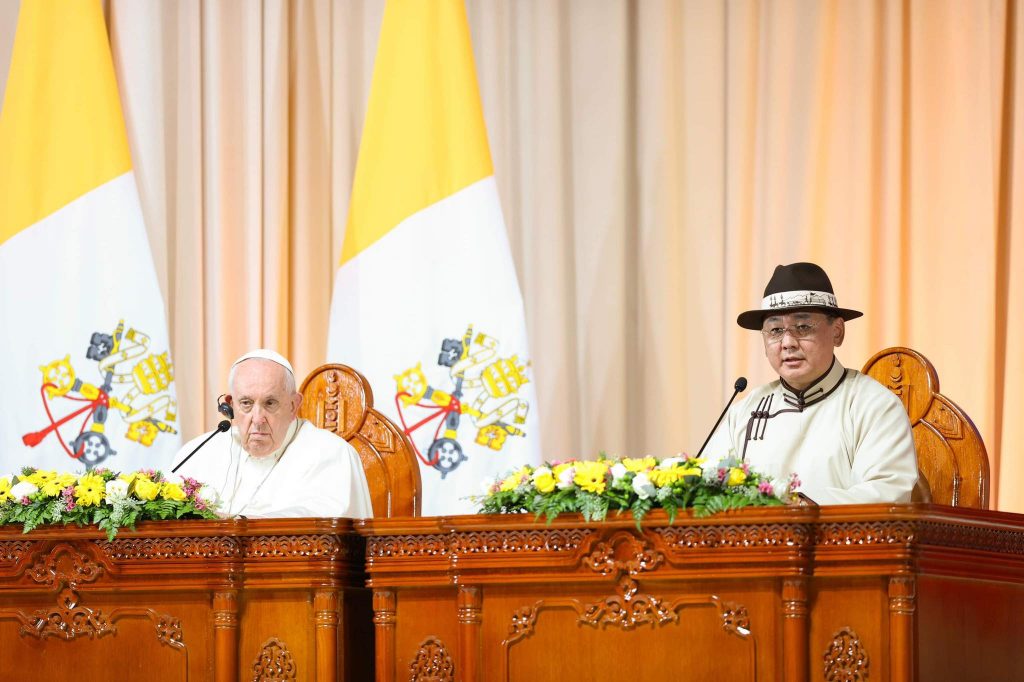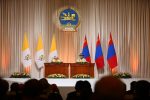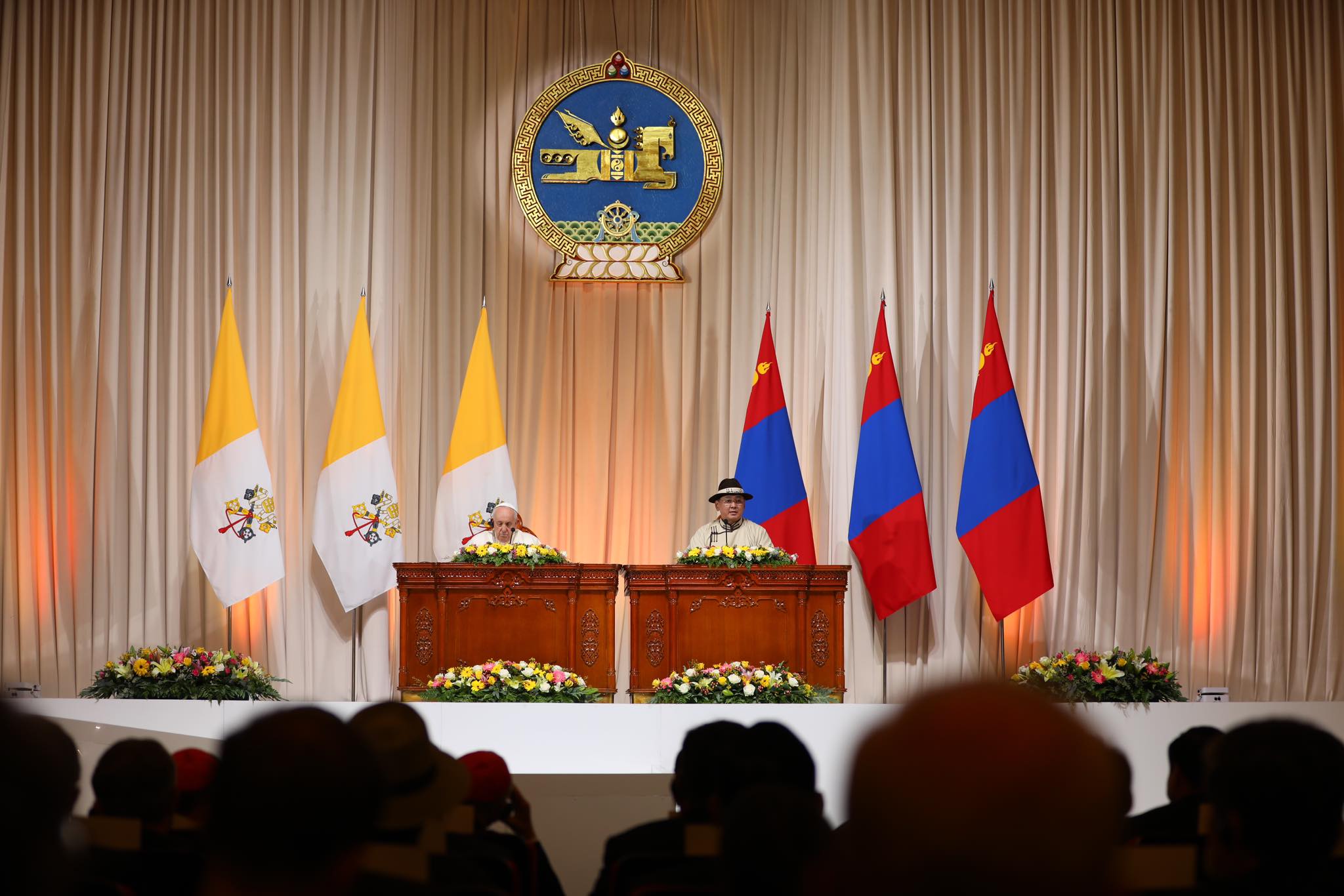THE PUBLIC ADDRESS BY PRESIDENT UKHNAA KHURELSUKH AND POPE FRANCIS
PRESIDENT OF MONGOLIA UKHNAA KHURELSUKH:
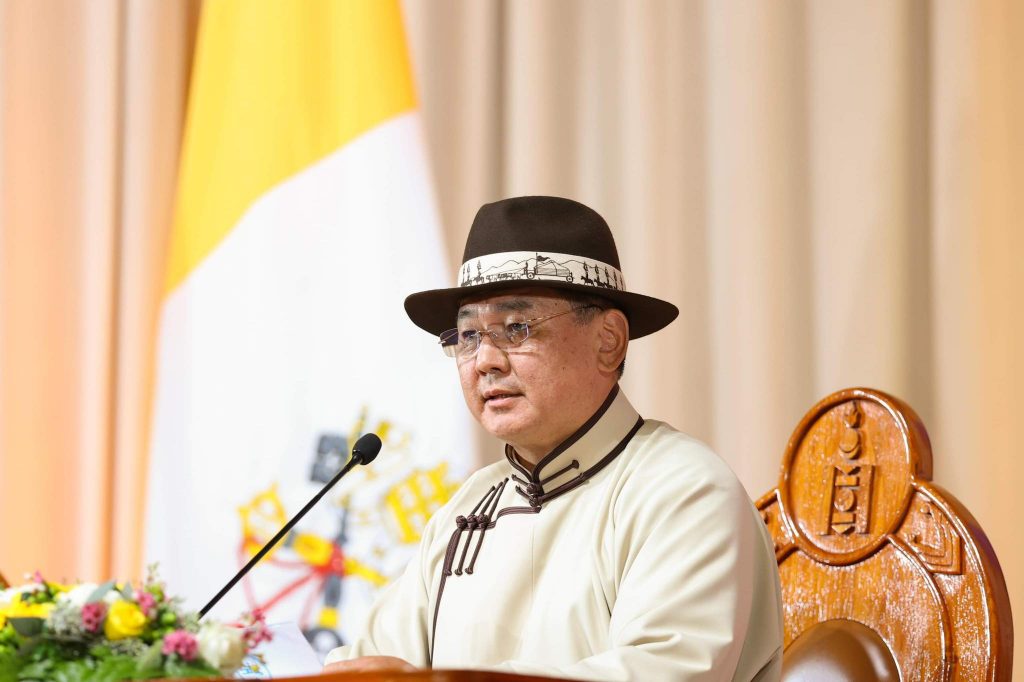
Pope Francis,
Ambassadors and Representatives of Diplomatic Missions accredited to Mongolia,
Distinguished guests,
I extend to all of you my heartfelt greetings on this historic day, when Pope Francis is paying the first-ever state visit to our exquisite country, land of the eternal blue sky, the sacred hearth of the Mongol Empire, the birth place of Chinggis Khaan, Man of the Millennium.
This state visit has a historical prominence in that it is being held on the occasion of the 860th anniversary of Chinggis Khaan and the 30th anniversary of the establishment of diplomatic relations between Mongolia and the Holy See.
The relations between Mongolia and the Holy See have a history originating from the era of The Great Mongol Empire founded by Chinggis Khaan.
Eight centuries ago, in 1246, Archbishop Plano Carpini, the envoy of the Pope Innocent IV, arrived in Karakorum, the capital of the Great Mongol Empire, and presented the Pope’s message to Guyug Khaan, grandson of Chinggis Khaan, that instituted the foundation of historical ties between our countries.
It should be acknowledged that Archbishop Plano Carpini was the first ever European envoy to enter the court of the Great Mongol Empire to establish official relations.
At that time, Papal envoy Plano Carpini had the great occasion to be invited to the Coronation ceremony of Guyug Khaan as a Guest of Honor.
His written work “History of the Mongols” which was based on memos of his journey, bestowed to the world, was the historical piece that introduced the history and culture of the Mongols to the Western world and to this day, it still plays a significant role for Mongol studies exploring Mongolia and Eurasia of the Middle Ages.
It is, indeed chronologically and numerically a fortunate occasion that Pope Francis of the Holy See pays a visit to Mongolia, the sacred heart of the Mongol Empire, precisely 777 years since Plano Carpini’s journey to Mongolia.
Since then, the relations between our two countries had been continuing with the exchange of envoys and letters such as the letter of Il Khaan Abaga to Pope Gregorio X in 1274, Pope Nicolas III to Khubilai Khaan in 1278, Il Khaan Argun to Pope Honorius IV in 1285, Pope Nicolas IV to Il Khaan Argun in 1288, 1289, Il Khaan Argun to Pope Nicolas IV in 1290, Il Khaan Gazan to Pope Boniface VIII in 1302 to name a few. These exchanges of numerous envoys and official letters as well as the reports about the communications between them were preserved as important historical sources of the history of the relations between our two countries.
These historical sources not only bear witness to active engagements for official negotiations and diplomatic relations between our two countries at that time, it also presents an excellent testimony of compelling assurance for a solid foundation, determining factor and essential feature for the further consolidation of extensive ties between Western and Eastern societies.
But in the modern-day Mongolia and the Holy Sea have been observing the 31st Anniversary of the establishment of diplomatic relations between our two countries and we have been continuing our humanitarian collaboration as well as our cooperation in the areas of culture, education and science.
As our relations have flourished, I extend our paramount appreciation to Pope Francis for his first-ever state visit to Mongolia.
Esteemed guests,
Chinggis Khaan and his successors, ancestors of all Mongolians, instituted the Great Mongol Empire. They established “Pax Mongolica” by uniting all the Mongol tribes, ending century long wars and conflicts in the East and West. These achievements were prerequisites for a peaceful coexistence and harmony among nations and people of Asia and Europe, which in return created a favorable environment and the opportunity to study and research, to write and compose, to produce and construct, to develop arts, sciences and education, fostering prosperity as a whole.
As a result of these attainments world renowned scholars and international organizations accentuate and reaffirm that the Mongols have significantly contributed to the world history. Achievements of Pax Mongolica have created the solid grounds for the development of mutual respect between different nations of the world, cherishing each other’s values and identities, enabling peaceful coexistence of various civilizations. They also confirm that flourishing of diplomatic relations, postal system, transportation, economy and trade, science, culture as well as tolerance of religious freedom and principles of rule of law were invaluable heritages inherited from the Mongols to the mankind.
The state principles to respect statehood, striving for peace with the ultimate goal to foster harmony and unity was inherited to us from Chinggis Khaan and this legacy has been relaying throughout many centuries, and today Mongolia is pursuing a peace-loving, open, independent, and multi-pillared foreign policy, and we are working consistently towards strengthening global and regional peace and security.
With a view to peacefully contributing to the international community’s efforts in addressing regional and global security challenges, Mongolia has been offering its initiatives and we are actively engaging with our two eternal neighbors as well as our third neighbors.
Mongolia has been contributing to the noble endeavors for ensuring global peace and security and diligently fulfilling its commitments to the international community with honour, while sending over 20 thousand peacekeepers to 15 UN Peacekeeping Operations, in the most precarious places of the world, for the last 20 years.
Mongolians have ancient traditions to respect spiritual freedom and pluralism. In the era of Chinggis Khaan and the Great Mongol Empire, our ancient capital Karakorum was home to 12 monasteries of different religions co-existing peacefully side by side consisting of Buddhist, Christian and Islamic religious traditions and Mongol Kings and statesmen had a deep respect for each religion, and every church and temple had the privilege to be exempt from state taxes.
These principles of respect for spiritual freedom and belief have been inherited to us from our ancestors and these principles were declared and preserved and protected in the Constitution of Mongolia.
Since ancient times, we Mongolians, with nomadic heritage, have been preserving and treasuring the Mother Earth and nature to pass it on to our future generations.
Pope Francis’ words, his position and policies on world climate change, food scarcity, food security and supply, are entirely in line with our national movements “Billion Trees”, “Food Revolution”, and “Healthy Mongolian” that are being implemented throughout the country. Thus, Mongolia will stand ready to cooperate with the Holy See in all areas to protect the environment, food and security, which is the backbone of a sustainable development and the destiny of mankind.
Moreover, I am convinced that our cooperation in humanitarian deeds, culture, science, education, history arts and archives, will be constantly further strengthened.
Pope Francis,
This state visit to Mongolia will inaugurate a new pillar to our peace-loving and multi-pillared foreign policy as well as a new page in the history of our countries, and will make an exceptional contribution to further strengthening our relations and cooperation, which will be engraved with golden letters.
On behalf of the people of Mongolia, I extend, to Pope Francis and to all the people of the world, my best wishes of good health, happiness, and well-being.
By the Power of Eternal Heaven, May the mankind be in lasting harmony!
POPE FRANCIS:
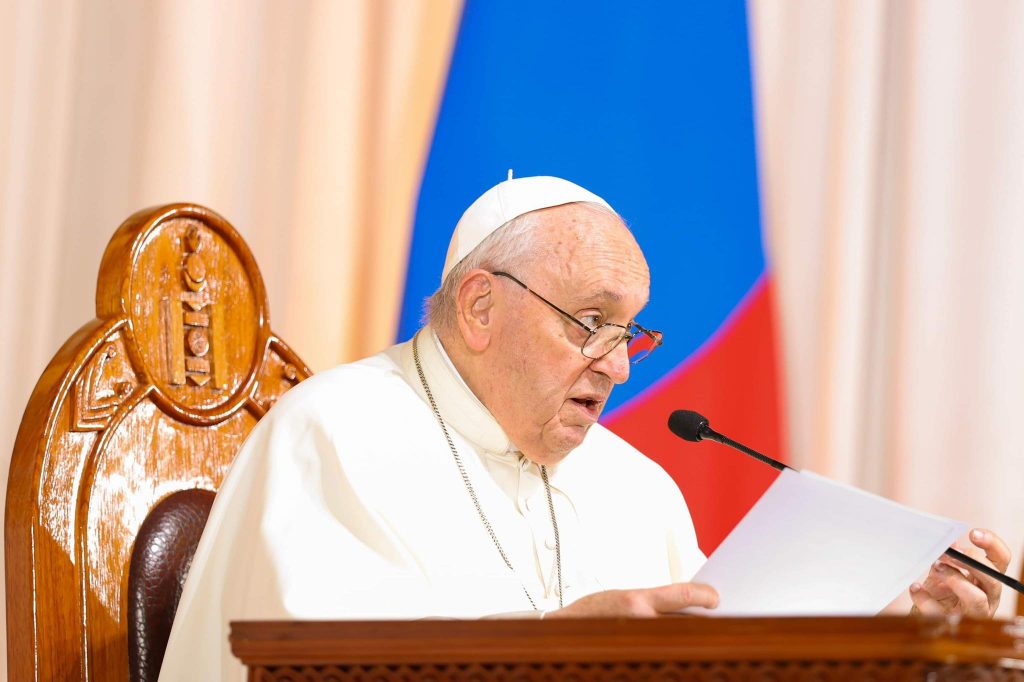
Mr President,
Mr President of the State Great Khural,
Mr Prime Minister,
Members of Government and the Diplomatic Corps,
Distinguished Civil and Religious Authorities,
Illustrious Representatives of the World of Culture,
Ladies and Gentlemen,
I thank His Excellency the President for his warm welcome and his kind words, and I greet all of you most cordially. I am honoured to be here, happy to have journeyed to this remarkable and vast land, and to a people fully conscious of the meaning and importance of what it is to “journey”. We see this in your traditional dwellings, the “ger”, fine travelling homes. I would like to imagine myself entering for the first time, with respect and anticipation, one of these circular tents that dot the majestic Mongolian lands, in order to meet you and become better acquainted with you. So here I am, standing at the door, a pilgrim of friendship, who comes to you quietly, with a joyful heart and the desire to find myself humanly enriched in your presence.
When we enter the home of friends, it is a fine custom to exchange gifts and to think back on earlier meetings. Modern diplomatic relations between Mongolia and the Holy See are recent; this year marks the thirtieth anniversary of the signature of a Letter consolidating bilateral relations. Yet much earlier in time, exactly 777 years ago, and specifically between the end of August and the beginning of September in the year 1246, Friar John of Pian del Carpine, as an envoy of the Pope, visited Guyug, the third Mongol Emperor, and presented to the Grand Khan an official missive from Pope Innocent IV. Shortly thereafter, a letter of response, bearing the seal of the Grand Khan in traditional Mongol letters, was written and translated in various languages. That letter is preserved in the Vatican Library, and today I am honoured to present you with an authenticated copy, executed with the most advanced techniques in order to ensure the highest quality possible. May it be the sign of an ancient friendship that is growing and being renewed.
I have been told that at daybreak, the children in your countrysides stand at the door of the ger and look into the distance to count the heads of cattle and then report that number to their parents. We too benefit from gazing towards the vast horizons everywhere around us, abandoning short-sighted perspectives for a broader, global vision. That is the lesson of the gers: born of the nomadic life of the steppes, they spread over a vast territory and became a distinctive feature of various neighbouring cultures. Mongolia’s immense territory stretches from the Gobi Desert
to the steppe, from the great plains to the pine forests and the mountain chains of the Altai and the Khangai. Intersected by winding rivers that, viewed from on high, resemble the intricate decoration on precious ancient textiles, your lands mirror the grandeur and beauty of the entire earth, which is meant to be an attractive and inviting garden. Your native wisdom, which has matured over generations of ranchers and planters respectful of the delicate balances of the ecosystem, speaks eloquently to those who in our own day reject the pursuit of myopic particular interests and wish instead to pass on to future generations lands that remain welcoming and fruitful. You help us to appreciate and carefully cultivate what we Christians consider to be God’s creation, the fruit of his benevolent design, and to combat the effects of human devastation by a culture of care and foresight reflected in responsible ecological policies. Gers are dwelling places that nowadays could be considered efficient and ecologically sound, inasmuch as they are versatile and multifunctional, with zero impact on the environment. Furthermore, the holistic vision of the Mongolian shamanic tradition, combined with the respect for all living beings inherited from Buddhist philosophy, can contribute significantly to the urgent and no longer deferrable efforts to protect and preserve planet Earth.
Gers, present in both rural and urbanized areas, likewise testify to the precious marriage of tradition and modernity, for they join the lives of old and young, and thus witness to the continuity of the Mongolian people. From ancient times to the present, this people has preserved its roots while opening, especially in recent decades, to the great global challenges of development and democracy. Mongolia today, with its broad network of diplomatic relations, its active membership in the United Nations, its efforts to promote human rights and peace, plays a significant role in the heart of the great Asian continent and on the international scene. I would also like to mention your determination to halt nuclear proliferation and to present yourselves before the world as a country free of nuclear weapons. Mongolia is a democratic nation that pursues a peaceful foreign policy, but also proposes to play an important role on behalf of world peace. It is significant too that, providently, capital punishment no longer appears in your judicial system.
Thanks to their adaptability to climatic extremes, gers make it possible to live in very diverse settings; this was the case during the epic times of the Mongolian empire, with its vast territorial expansion. I am pleased too, that I have come to Mongolia on the 860th anniversary of the birth of Genghis Khan. The fact that the empire could embrace such distant and varied lands bears witness to the remarkable ability of your ancestors to acknowledge the outstanding qualities of the peoples present in its immense territory and to put those qualities at the service of a common development. This model should be valued and re-proposed in our own day. May Heaven grant that today, on this earth devastated by countless conflicts, there be a renewal, respectful of international laws, of the conditions of what was once the pax mongolica, that is, the absence of conflicts. In the words of one of your proverbs, “the clouds pass away, but the sky remains”. May the dark clouds of war be dispelled, swept away by the firm desire for a universal fraternity wherein tensions are resolved through encounter and dialogue, and the fundamental rights of all people are guaranteed! Here, in this country so rich in history and open to the sky, let us implore this gift from on High, and together let us strive to build a future of peace.
Upon entering a traditional ger, our gaze is directed upwards to the highest central point, where there is a round window that allows light to enter and the sky to be admired. I would like to emphasize the importance of this fundamental attitude that your tradition helps us to appreciate: the ability to keep our eyes fixed on high. Raising our eyes to heaven – the eternal blue sky that you have always venerated – means persevering in an attitude of docile openness to religious teachings. A profound spiritual sensitivity belongs to the very fibre of your cultural identity, and it is proper that Mongolia should be a symbol of religious freedom. In the contemplation of boundless and sparsely settled horizons, your people have developed a refined spiritual sense, born of nurturing silence and interiority. The solemn grandeur of the countless natural phenomena that surround you has given rise to a sense of wonder, which instils simplicity and frugality, a preference for the essential and a capacity for detachment from what is not. Here I think of the threat represented by the consumerist spirit that nowadays, in addition to creating great injustices, leads to an individualistic mindset that cares little for others and for sound established traditions. When religions remain grounded in their original spiritual patrimony, and are not corrupted by sectarian deviations, they prove to be trustworthy supports in the construction of healthy and prosperous societies, in which believers work to ensure that peaceful coexistence and political foresight are placed increasingly at the service of the common good. At the same time, they also represent a safeguard against the insidious threat of corruption, which effectively represents a serious menace to the development of any human community; corruption is the fruit of a utilitarian and unscrupulous mentality that has impoverished whole countries. It is a sign of a vision that fails to look up to the sky and flees the vast horizons of fraternity, becoming instead self-enclosed and concerned with its own interests alone.
In contrast, many of your ancient leaders taught you to keep your gaze fixed on high and on the vastness of the landscape. They demonstrated an uncommon ability to integrate different voices and experiences, also from the religious standpoint. A respectful and conciliatory attitude was shown with regard to the variety of sacred traditions, as is witnessed by the different places of worship – including one Christian site – preserved in the ancient capital Kharakhorum. As a result, it was almost natural that you arrived at the freedom of thought and of religion now enshrined in your Constitution. Having left behind, without bloodshed, the atheist ideology that thought it could eliminate religion, deeming it a hindrance to development, you have come to acknowledge and respect the fundamental importance of harmonious cooperation between believers of different faiths, each of whom, from his or her own particular point of view, contributes to the moral and spiritual advancement of peoples.
In this regard, the Mongolian Catholic community is happy to continue making its proper contribution. It was, in fact, in a ger that, a little more than thirty years ago, the Catholic community began to celebrate its faith, and the present Cathedral, located in this great city, is reminiscent of the shape of a ger. These are signs of the Catholic community’s desire to share its life and work, in a spirit of responsible and fraternal service, with the Mongolian people, which is also its own people. For this reason, I am pleased that this community, however small and discreet, shares with enthusiasm and commitment in the country’s process of growth by spreading the culture of solidarity, universal respect and interreligious dialogue, and by working for justice, peace and social harmony. It is my hope that, thanks to legislation that is farsighted and attentive to concrete needs, local Catholics, assisted by consecrated men and women who, for the most part, necessarily come from other countries, will be able, always and without difficulty, to make their own human and spiritual contribution to Mongolia, for the benefit of this people. The negotiations presently taking place for the stipulation of a bilateral agreement between Mongolia and the Holy See represent an important means for the attainment of those conditions essential for the pursuit of the ordinary activities in which the Catholic Church is engaged. In addition to the specifically religious aspect of worship, these include its numerous initiatives in the service of integral human development, carried out not least in the areas of education, healthcare, social assistance, research and cultural advancement. These initiatives bear clear witness to the humble, fraternal and solidary spirit of the Gospel of Jesus, the one path that Catholics are called to follow in the journey that they share with all the peoples of the earth.
The motto chosen for this Journey – Hoping Together – expresses quite well the innate potential of the journey we are making together in a spirit of mutual respect and cooperation in pursuit of the common good. The Catholic Church, as an ancient institution present in almost every country of the world, embodies a noble and fruitful spiritual tradition that has contributed to the development of entire nations in numerous fields of human activity, from the sciences to literature, from the arts to political and social life. I am certain that Mongolian Catholics will continue to offer readily their proper contribution to the building of a prosperous and secure society, in dialogue and cooperation with all others who dwell in this great land kissed by the sky.
“Be like the sky”. In these words, a famous poet encouraged us to rise above the transience of earthly events and to imitate the breadth of spirit symbolized by the immense, clear blue sky that we contemplate in Mongolia. Today, as pilgrims and guests in this country that has so much to offer to the world, we too want to accept that invitation and translate it into concrete signs of compassion, dialogue and shared vision for the future. May the various components of Mongolian society, so well represented here, continue to offer to the world the beauty and nobility of this unique people. In this way, like your traditional vertical script, may you remain ever “upright” in your efforts to relieve the great human suffering all around you, reminding everyone of the dignity of each human being, called to dwell in our earthly home by embracing the sky. Bayarlalaa! [Thank you!]
